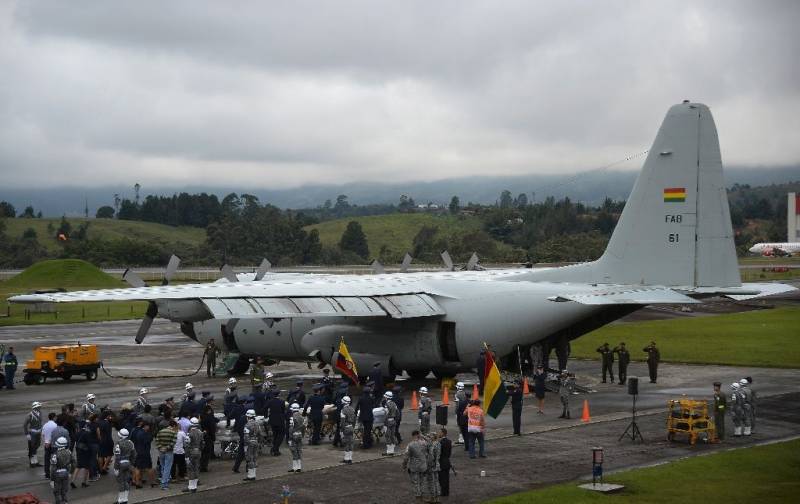MEDELLIN, COLOMBIA: The bodies of the 71 victims killed in a plane crash in Colombia that wiped out a Brazilian football team returned home, as mourners prepared a massive funeral.
Along the road to the airport, hundreds of people brandished flowers, white balloons and Colombian flags to pay a final farewell to the victims of Monday's tragedy.
The remains of the first victim, Paraguayan crew member Gustavo Encina, were handed over to his family early Friday in a coffin draped in his country's flag.
The other victims -- 64 Brazilians, five Bolivians and a Venezuelan -- were flown home on a series of flights throughout the day.
"What we want now more than anything else is to go home, to take our friends and brothers home. The wait is the worst," said Roberto Di Marche, a cousin of football team Chapecoense Real's late director Nilson Folle Junior.
In the club's hometown, the southern Brazilian city of Chapeco, more than 100,000 people -- about half the city's population -- are expected to attend a memorial service Saturday in honor of the team, whose fairytale season was tragically cut short.
FIFA chief Gianni Infantino canceled a trip to Australia to attend the funeral.
Officials said Brazilian President Michel Temer would likely travel to Chapeco as well.
"The #Chapecoense will remain in our memory for their perseverance and tenacity. I reiterate my deepest solidarity with relatives of the victims," Colombian President Juan Manuel Santos wrote on Twitter as the last plane departed.
The bodies will be carried during a funeral procession through the city, ending with a ceremony at the team's stadium.
Authorities are still investigating what caused the charter flight to smash into the mountains outside Medellin, where Chapecoense was due to play the biggest match in its history -- the finals of the Copa Sudamericana, South America's second-largest cup tournament.
A harrowing recording has emerged of the panicked pilot asking the control tower for priority to land because he was out of fuel, which would make the crash tragically avoidable.
Colombia's civil aviation safety chief, Freddy Bonilla, said the plane disregarded international rules on fuel reserves.
- Bolivian probe -
The Bolivia-based charter company, LAMIA, had its permit suspended Thursday, and the government there ordered an investigation into its operations.
Bolivia has also suspended the executive staff of its civil aviation authority and the airports administrator for the duration of the probe.
Investigators are examining pilot error and air traffic control problems as possible factors in the crash.
Prosecutors from Bolivia, Brazil and Colombia are due to meet in Santa Cruz on December 7 to discuss joint efforts to investigate the tragedy, sharing evidence and evaluating theories, Colombian prosecutors said.
Pilot Miguel Alejandro Quiroga's remains were flown home Friday along with four Bolivian crew who died in the crash.
The disaster killed most of Chapecoense's squad and 20 journalists traveling with them to cover the match.
LAMIA, which specializes in flying Latin American football teams, had ferried local clubs and national sides around the region, including superstar Lionel Messi.
- Haunting crash scene -
Six people miraculously survived the crash.
All remained hospitalized Friday.
"I'm in shock," said flight attendant Ximena Suarez Otterburg, who was found injured but conscious after the crash.
"God can't explain the pain I feel," she wrote on Facebook.
Other survivors were in various stages of recovery.
Chapecoense defender Alan Ruschel was in intensive care after back surgery, while goalkeeper Jakson Follmann has undergone multiple surgeries including the amputation of his right leg.
A haunting video meanwhile emerged of the moment rescuers found Bolivian crew member Erwin Tumiri.
"Alex! Angel! David! Where's my crew?" shouted the visibly disoriented man, as rescuers tried to calm him.
- Devastated families -
Co-pilot Ovar Goytia's 18-year-old son recalled his final conversation with his father.
"I spoke with my daddy 10 minutes before the flight took off. I only spoke to him to say goodbye and make sure everything was OK. He just said to take care of the home, of my brothers, that I was the man of the house, and that he'd be back," he told AFP.
Getting the news "was a dagger in my heart," he said. "As if my world was ending."
Goytia, who is in flight school to follow in his father's footsteps, called his dad a "great pilot" and said he was sure he did everything possible to save his passengers' lives.







